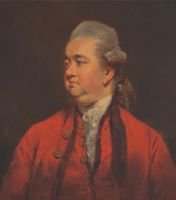| Notes |
- --- "Edward Gibbon, 1737-1794" by D.M. Low, 1937, page 3-5:
Gibbon was in fact under five feet in height, and Lord Sheffield remarks that although he became extremely corpulent in later years, his bones were small and finely made. Fanny Burney gives a vivid confirmation of this. She met Gibbon for the first time in 1782 when she was in the first flush of fame from Evelina. 'His neat little feet are of a miniature description and with these as soon as I turned round he hastily described a quaint sort of circle, with small quick steps and a dapper gait, as if to mark the alacrity of his approach, and then, stopping short when full face to me, he made so singularly profound a bow that -- though hardly able to keep my gravity -- I felt myself blush deeply at its undue but palpably intended obsequiousness.'
. . . Miss Burney found his look and manner 'placidly mild, but rather effeminate,' and his voice when he talked with Sir Joshua 'gentle but of studied precision of accent'. Most witnesses agree on his deliberate and rather affected manner of speaking, and Suard says he spoke in a falsetto tone.
. . . With age he gave increased attention to his appearance. In the year after his appointment as a Lord of Trade he had a tailor's bill for £145 14s. 10-1/2d. His taste was loud even for that colourful period. We can still read of his 'Burgundy coloured cloth frock with orange shag velvet waistcoat, laced with gold and silver lace,' etc. Quantities of lavender water, pomade and powder were no doubt not exceptional, but it is difficult not to smile at his using bandeaux for the hair at night. He wore his own hair in later years. A lock preserved in the British Museum is of a deep red colour with few signs of grey.
--- "Northampton Mercury" 25 Jan 1794, page 4:
Thursday died, at his lodgings in St. James's-street, Edward Gibbon, Esq. author of the celebrated history of the decline and fall of the Roman empire, &c. -- Mr. Gibbon was in his 58th year. He had come several months ago on a visit to England, and purposed again returning in the Spring, to his charming house at Lausanne. He had lately undergone the palliative operation for the hydrocele, but the cause of his death was a gouty spasm in the stomach. His sufferings were short, for he enjoyed his usual flow of spirits, and conversed with as much gaiety as he writes, the night before his death.
|
 [1]
[1]  [2]
[2] 
 (Age 63 years)
(Age 63 years)  (Age 35 years)
(Age 35 years) 
